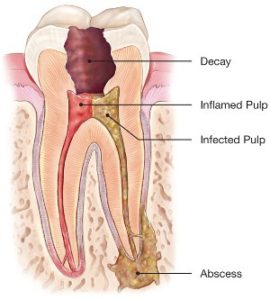Root Canal Dentistry in Calgary SW

At Sierra Dental, we are equipped with cutting-edge technology for accurate diagnosis and precise treatment with root canal therapy. These deliver the most favourable results for patient satisfaction.
If you are experiencing severe tooth pain or have been told that you need a root canal, please contact our office for an evaluation. We are here to help with the best dental solutions.
Meet Our Endodontists
Meet Dr. Kiarash Shabehpour
Dr. Kiarash Shabehpour (or Dr. Kia as his patients and colleagues tend to call him) is a Certified Specialist in Endodontics. He finished his specialist training at the University of British Columbia, where he is currently a clinical instructor helping with training of the next generation of Endodontists.
Dr. Shabehpour practices in both Alberta and British Columbia and along with his team, helps his patients and colleagues with root canal related procedures on a referral basis. He is experienced in performing endodontics-related surgeries. Dr. Shabehpour is fluent in both English and Farsi.
When not working, he loves spending time with his family, indulges in martial arts of Judo or can be found on the slopes, skiing.
Dr. Shabehpour is proud supporter of animal rescue groups worldwide.
What Is A Root Canal?
Root canals are the space inside the hard layers of each of your teeth.
Within each canal, there is a bundle of nerves, blood vessels, and connective tissue that help the teeth to grow and develop. This bundle, called pulp, can become inflamed or infected leading to pain and sensitivity to biting and temperature changes.
Normally, the dental pulp is protected by hard layers of dentin and enamel, but deep decay or fractures due to biting or other trauma can injure the pulp and allow bacteria to enter the chamber.
Endodontic Procedures
Root Canals
The most basic treatment with Endodontics in Calgary is root canal therapy. Each root canal will be cleaned, shaped, and medicated to eliminate bacteria causing infection. When the tooth has healed, a filing material will be placed to reinstate the health of the tooth.
Then, a crown is placed over the tooth for protection and restoration of function and appearance.
Endodontic Retreatment
In some cases, previous Endodontic treatment may need to be retreated. This may happen when the original infection fails to heal or recurs after some time. Other indications for endo retreatment may involve a crack or break on the tooth underneath or decay on the root canal-treated tooth.
Endodontic retreatment is very similar to the initial root canal therapy. The crown will be removed, then all root canals will be cleaned, medicated, and sealed with a new filling, and the tooth will be restored with a new crown.
Root Surgery
A root surgery is also called apicoectomy. This is a process that removes infection on the tooth root that a standard root canal treatment cannot solve.
With this treatment, a minor surgical procedure will be performed. The inflamed gum tissue will be flapped open to gain access to the tooth root. Then, the tip of the root is removed or resected to completely eliminate dental cyst or infection.
Dental Trauma
Accidental blows to the face may cause dental trauma. The tooth may be pushed into the socket, it may crack, or it can be completely knocked out. For these situations, the tooth can still be saved with root canal treatment.
The earlier you are able to visit your Endodontist, the better the chances are for saving the tooth. This is especially for a tooth that is knocked-out from its place. Until you can visit your dentist, you can place the tooth in a container with saliva or full milk so your dentist can try to put it back in place.
Benefits of Root Canal Treatment
Root canal treatment is the procedure between a dental filling or crown and tooth extraction. If the decay or damage is too extensive for simple dental fillings, or if an infection affects the tooth, a root canal is the treatment of choice. But if this is not done immediately, your dentist may recommend extraction.
So, in a way, Endodontics in Calgary prevents the consequences that come with tooth extraction. Other benefits include:
- Eliminates infection
- Relieves any pain and inflammation
- Restores optimal oral health
- Keeps the teeth in proper alignment by preventing tooth loss
- Improves the aesthetics and normal tooth functions after final restoration
- Preserves the health of neighbouring teeth and surrounding gums
- Prevents serious health complications
Root Canal Treatment Steps
- During your treatment with us, our dentist will perform a procedure to ensure that you are a suitable candidate for a root canal treatment.
- Our dentist will then proceed to administer anesthesia around the infected tooth and place a rubber dam near it to keep the area dry. This will ensure your comfort during the procedure.
- Drilling, which usually takes about 5 minutes, will help clean out any pulp and bacteria inside the tooth. During this step, your tooth will be rinsed with disinfectant to help wash out any debris.
- The tooth may or may not get resealed, depending on the circumstances of your case. For example, some root canals may take a few visits to complete, in which case a temporary filling will be placed over the hole to be finished in the next visit.
- If this procedure is completed by a dentist other than your main provider, a procedure report will be sent to your dentist, who will schedule an appointment for you in two or three weeks. During this follow-up appointment, your tooth will be prepared for a crown and you will leave with a temporary crown. One to two weeks later you will have another visit when your permanent crown will be inserted.
Though the pain may subside after the first visit for a root canal, it’s important to finish the procedure to avoid further infection.
Is Root Canal Treatment Painful?
We understand that some patients associate root canal treatment with pain. Because of the presence of infection, local anesthetics directly administered to the tooth may not work. But at Sierra Dental, we employ modern dental solutions to improve your comfort and experience with root canal therapy.
- Laughing gas – this utilizes nitrous oxide, a gas that helps you relax within minutes of inhalation.
- Oral sedation – using pills that produce a sedative effect, such as Valium, Halcion, etc., our Endodontist can perform the treatment, and you will not feel any pain.
- IV sedation – less commonly used but can produce impressive sedation effects to relieve you of anxiety during Endodontic treatment
Discover relatively painless root canal treatment with these sedative dentistry techniques at Sierra Dental. Providing this alongside Endodontics in Calgary puts you in a “sleepy” state wherein you are less aware of the treatment, so you do not experience any pain. Instead, you are in a calm, relaxed peace of mind as your dentist works to save your tooth.
Root canals have gained an unfair reputation with patients.
A dentist may recommend a root canal to a patient after weighing different treatment options. Sometimes, there’s no way around a root canal when it comes to the damaged dental pulp, and ignoring the problem will only result in pain and potential worsening of tooth decay or infection.
The only case where you are not suitable for a root canal is if you have experienced a significant bone loss or decay that makes your tooth not suitable for a crown. If this is the case, our dentists can recommend alternative treatments for you.
The cost of a root canal varies from case to case and includes factors, such as, which tooth needs to be treated and how many canals the pulp has.
A tooth should recover to full usage after a successful root canal procedure and recovery.
Other alternatives are available such as tooth extraction, and root irrigation but these alternatives may be more invasive or won’t provide the same long-term solutions as a root canal. An implant may also be an option that your dentist can discuss with you.
Root canal treatments are typically more cost-effective than tooth removal, followed by a crown procedure.
Post-treatment care for a root canal is relatively straight-forward.
Over-the-counter pain medications may be used to help regulate pain, or stronger pain medication may be prescribed if needed.
In either case, it’s important for patients to closely follow medication instructions and note these medications could make them drowsy.
Tenderness may last for a few days after a root canal.
A few things to notice include swelling in the gums, or if your bite feels uneven.
You should contact your dentist if you have any questions or experience severe pain for more than a few days.
Sierra Dental accepts new patients and takes pride in doing our best to provide comfortable root canal procedures to our patients.
More Insights
What is a root canal treatment?
A root canal treats infection inside a tooth. When the tissue (or pulp) inside the tooth becomes infected, a dentist will need to enter the tooth to either disinfect or entirely remove the pulp.
Do you need a crown after a root canal?
Crowns are not always necessary after a root canal, but they do provide protection for the tooth. Talk to your root canal dentist about your specific needs.
What is the average root canal cost in Calgary?
Typically, root canal treatment in Calgary will cost in the range of a few hundred dollars up to $2,000. Check with your local provider for his rates and ways of working.
Say Goodbye to Chips and Gaps in One Visit!
We are proud to help patients across Calgary and the surrounding areas achieve natural, confident smiles through cosmetic dental bonding and other personalized cosmetic dentistry solutions.
Whether you are fixing a chipped tooth, closing small gaps, or reshaping your smile, our experienced Calgary dentists are here to guide you!
We are currently accepting new patients! Book your appointment today and let us create a smile you’ll love for a long time.
EVENING & WEEKEND APPOINTMENTS!
We understand that you are busy and don’t always have time to visit a dentist for a routine checkup in the middle of your Monday. That’s why we offer extended hours from 7:00 AM to 8:30 PM Monday through Thursday.
We are also open all throughout the weekend. That’s right, we’re open every day of the week.
DIRECT BILLING TO INSURANCE PLANS
To support our clients, we offer direct billing, predeterminations of treatments, and financial arrangements to all our patients to ensure smooth and easy payment transactions.
PAYMENT PLANS & FINANCING AVAILABLE
We understand that dental services can be an unexpected expense. That’s why we offer flexible payment plans and options to suit our patients’ needs. Speak with one of our dental administrators to learn more.
FREE PARKING
At Sierra Dental, you will never struggle to find parking. Our clinics offer convenient parking options that are free of charge to our patients. It’s one more way we work to put a smile on your face.
